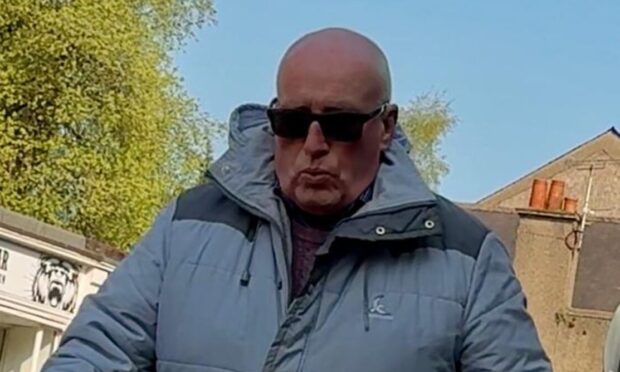A breakdown in communication between Perth Prison’s health team and the local hospital may have contributed to the death of a remand inmate from Dundee.
Scott Ross, 37, of Court Street North, died in his cell at HMP Perth early on June 21 2018.
He had been on remand for a week facing drug misuse and culpable and reckless conduct charges.
A fatal accident inquiry at Perth Sheriff Court found the cause of death was probable drug withdrawal seizures.
The inquiry heard he had been taken from the prison to Perth Royal Infirmary (PRI) several times after having seizures.
PRI staff deemed the seizures “behavioural” and failed to recognise they were symptomatic of his drug withdrawal.
The hospital had been treating him as if he were withdrawing from opiates when he was actually coming off benzodiazepene – Valium or similar
The judgement by Sheriff William Wood after the FAI into Mr Ross’s death found it could have been avoided had other steps been taken.
Seizures deemed ‘behavioural’
The inquiry heard on arrival in prison on June 14, Mr Ross told staff he had been – daily – snorting 1.5g of heroin and taking between 40 and 50 Valium tablets, as well as methadone and pregabalin.
On the morning of June 16 2018, Mr Ross had a ten-minute seizure followed by a second in the afternoon, after which he was moved to an observation cell, where he had another.
Mr Ross was taken by ambulance to PRI, where a doctor told him his seizures were due to “going cold turkey from heroin.”
On the journey back to prison on June 17, Mr Ross was sick and may have had a seizure.
At 4pm that day, he had another seizure – dismissed as “behavioural” by the doctor after the prison nurse contacted PRI.
He was taken back to hospital at 5.30pm and next day, was recorded as having “seizure-like activity”.
Sheriff Wood noted he was also recorded as having “heavy breathing, pretending to have a fit but doctors are not believing him”.
Mr Ross refused to cooperate with his discharge, “faked a fit” and had to be carried on to the prison van.
On his return to jail, he was unable to speak or respond to simple commands.
He was later found lying on the floor of the cell in a state of “stupor” and while staff phoned PRI again, Mr Ross had another seizure.
He was brought to PRI’s high dependency unit and intubated.
He was due to be discharged again the following day, June 19, but had a fit on the floor when prisoner transport arrived.
Staff said he remained fit to be discharged.
Overnight in jail, Mr Ross was subject to half-hourly checks but found unresponsive at dawn and declared dead after resuscitation attempts.
A post-mortem stated the cause of death was established as “probable drug withdrawal seizures”.
Confusion over drug use
It was established the prison health team had used a different assessment method to that of the hospital.
Sheriff Wood wrote in his judgement: “(Upon arrival in prison) he was prescribed a “standard detox”.
“Between 16 June 2018 and 18 June 2018, Mr Ross was admitted to Perth Royal Infirmary on three occasions.
“PRI carried out their own assessment, in accordance with their own protocols, which differed from that used by the prison.
“The hospital was not aware of the prison protocol or the terms of the “standard detox” prescribed; and their own assessment did not indicate that diazepam medication was necessary.”
He found the death could have “realistically been avoided” if Mr Ross had been prescribed treatment and that had been increased in the event of further seizures, if PRI had provided a realistic detoxification plan to keep him safe and if the detox plan had been consistent.
The inquiry also found Mr Ross should have been readmitted to hospital the day before he died.
The FAI found “standard detox” protocol used by prison health care staff did not take into account pre-existing levels of abuse and may not be adequate in every case.
It found Mr Ross did not receive enough benzodiazepenes to prevent seizures and death.
Had a bespoke approach been taken and adequate levels of diazepam been administered, Mr Ross might not have required hospital admission at all.
The inquiry also found that there was a lack of co-ordination and communication between the approach taken by medical teams at the prison and at the hospital in this instance.
‘System faults’
Sheriff Wood said: “The death of Scott Ross was unusual, although it has laid bare
the possible consequences of inadequate communication between one branch of health care and another.
“The discharge from hospital of a patient who might otherwise return home must be seen as different from discharging a patient back to a prison setting where, by definition, he/she will be kept under lock and key.
“It may well be a rare occurrence that there are fatal consequences from the failure to communicate effectively and timeously but that does not mean that there are no faults in the system.”
Changes since 2018
Health issues within the prison are the preserve of the NHS.
A spokesperson for Perth & Kinross Health & Social Care Partnership said: “Our thoughts remain with the family and we will now take time to consider the sheriff’s determination.”
The said changes have been made since 2018.
“When a patient is transferred from a prison environment to a healthcare facility we ensure that their medical information is transported with them.
“The service also benefits from the use of Consultant Connect, a telephone advice service where staff can connect directly to a hospital consultant to discuss their concerns regarding a patient.
“During these conversations, detailed medical information is provided which allows the prison healthcare team and the hospital consultant to jointly agree a management plan for the patient.
“Prison healthcare has also improved processes for patients who require drug withdrawal management.
“Patients receive regular substance use reviews and commence appropriate treatment as soon as they are admitted.
“Plans are in place to introduce a detox clinic within HMP Perth which will ensure that treatment is tailored to the individual patient.
“Each patient will be assigned a case worker and they will meet regularly to discuss appropriate treatment options.”
For more local court content visit our dedicated page or join us on Facebook.













